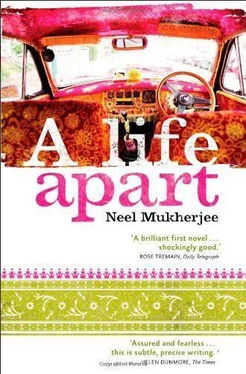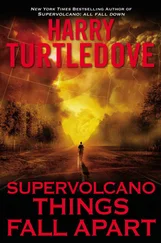‘Priest boy will read a story now. You can choose the book.’
‘How generous of you. Thank you.’ The acid crept up his throat. If Anne heard it, she didn’t say anything. There was always the danger that she registered far more things than she ever let on. Ritwik had found out that Anne clocked things with the beady-eyed sharpness of a bird, bringing them out later, at unexpected and sudden moments, seemingly without motive, but they never failed to unsettle Ritwik deeply. It was like having your bookshelf suddenly break into speech one morning, ‘You don’t really have time for a wank now, why don’t you go down and make Anne her tea?’
So he did exactly what he was told: he chose the book. He got out of bed, went over to the bookshelf and picked out his Arden edition of Hamlet. Teach her a lesson, this one; let’s see if she ever asks me to read again.
‘Shall we go to my room? Richard shot himself in here. It was his study, you see,’ she said.
Just like that. No warning, no advance preparation, nothing. As if it were as trivial as saying, ‘This room is too dusty, let’s go sit somewhere else.’ Ritwik knew that the questions which swarmed into his mind, like humming locusts, a huge drove of them, would receive no answers, not even the basic one, ‘Who is Richard?’ He filed the comment away, heavy, dangerous, like a bullet, in his head. Like Anne, he would bring it up when least expected, see if surprise led to a chink in this wilful wall.
‘I removed all the pictures and drawings of birds from the house after that. The bloody lot. Gave them away, drove out to a landfill and got rid of the rest,’ she keeps talking to herself.
‘OK, let’s go to your room,’ he said, his voice perfectly modulated, normal. Overnormal. ‘Do you want me to take your arm?’
When they were settled in Anne’s room, with its musty smell of dust, sourish yeast and the new liquid detergent Ritwik had bought last week, he opened the book at random and started reading, his delivery flat, expressionless, as deliberately droning and undramatic as he could make it.
O Hamlet, speak no more.
Thou turn’st my eyes into my very soul,
And there I see such black and grained spots
As will not leave their tinct.
To this, Hamlet then says,
Nay, but to live
In the rank sweat of an enseamed bed,
Stew’d in corruption, honeying and making love
Over the nasty sty!
Something in the words, some feathery whisper behind this son chiding his mother, his disgust oozing out from the fascinated, sick lump of words he had so lovingly chosen to pin her down, lulled Ritwik into stressing the right syllables, even doing different vocal modulations for Gertrude and Hamlet. He left out his tags, ‘This is the Queen’, ‘Now Hamlet says’, and let the drama tug him away.
O speak to me no more.
These words like daggers enter in my ears.
No more, sweet Hamlet.
Anne’s head was lolling. There were bubbles forming and breaking, accompanied by the rhythmic drone of slight susurration, on her lips. Ritwik stopped, reached for the edge of her counterpane and tried to wipe her mouth. At that very instant, she opened her eyes, pin-sharp, unreadable, and said, ‘Christopher died in India. Malaria. A severe type, they said. That’s why I came back. Richard was in school here. I could hardly live there on my own.’
What on earth was she saying? She was in India? When? Why wait for four months and then mention it? Why not in the very beginning when an Indian person was moving in? Who was Christopher? Which bit of India? When? Why? Was Richard her son? Was Christopher her husband? Would Gavin know? Why hadn’t he said anything?
He continued his reading, leaping over lines because Anne’s words had made him miss pages and he didn’t want to waste time finding the line where she had lobbed her explosive: he didn’t want to give her an excuse to think he was unduly curious about her life.
Mother, for love of grace,
Lay not that flattering unction to your soul,
That not your trespass but my madness speaks. .
‘We lived first in Delhi and then in Almora. Christopher was with the Forest Commission. You’re not from there, are you? You look different.’
‘No, I’m from Calcutta.’
‘Never went there. I went out there when I was your age. Came back ten years later. Changed something in me. Didn’t like it there, not to begin with. Not even while I was there. But after I came home, for years I went around missing something, not sure quite what. Felt a bit empty. Pale. Make no mistake, I was relieved to be back here. But then, over time, I got bored, I suppose.’
Ritwik kept very quiet. It was like watching a very rare animal come out to drink; if you so much as exhaled, it would immediately bound off, never to be spied again.
‘One of Christopher’s officials was eaten by a tiger. Fancy that. Hoo hoo hoo hoo.’ The laugh was like a high moan of a malicious wind in the pliable top branches. ‘Shouldn’t laugh. But it seems so unbelievable now. Tigers carrying off people. They were doing track repairs to the railway lines, I think.’ Pause. ‘No, I think I’m confusing it with something else. Heavy rains and the whole rail track got flooded. They had to take a boat from Ranikhet. A boat on the railway lines.’ Her voice was becoming faint, she seemed to be losing the thread of her story. She looked distracted.
‘Christopher was born there. Son of an army bigwig, Lieutenant-General or something. His mother was a very unconventional woman. Must have had a lot of steel in her to have broken all the rules in that society. Ran a school for Indian girls. Unimaginable at that time, really. Loved India. Passed it on to her son. You know what they say, India rages like a hectic in your blood’ — the way he started and looked up sharply, the allusion could have been a jet of ice-cold water between his eyes— ‘you have to go back. It does something to you, to your senses, your blood, Christopher used to say. So he went back. Joined the civil service and went back to his first love.’
Ritwik was speechless. He let this torrent of information seep in slowly, then asked, ‘What happened then? Did you meet him in England? And his mother?’
Long pause.
‘Could you keep an eye on the fat sparrow and see Ugo doesn’t go near it?’ There, the curtains had come down again.
‘It will be difficult to do that.’
And then, like the curl of a whip lashing out, ‘You don’t have a mother, do you?’
Nothing will wrongfoot him, nothing will make him pause. ‘No.’ Brief, like the truth.
‘So he’s going mad and making all sorts of wild accusations about his mother. Go on then, why did you stop?’
O Hamlet, thou hast cleft my heart in twain.
He says,
O throw away the worser part of it
And live the purer with the other half.
Good night. .
His voice was a straight, grey road, monotonous and vistaless. He read the words without managing to get to the meanings behind them. When he lifted up his burning face next, at the sound of a gentle purr, Anne’s head was twitching on the pillow, gently pumelled by unknown dreams. He sat there for a while, waiting for the rhythm of her snoring to calm him down, and then turned the light off. Ugo had come in unheard and was rubbing himself against him, purring so loudly that Ritwik was half-convinced he had some pulmonary illness. He picked the cat up and gently left the room. Ugo could come and curl up on his duvet while his fingers gently kneaded the creature’s thick orange pelt.
He turns off his bedside lamp: the sky outside has lightened enough. Another twenty minutes of snoozing, then he will have to go about his morning duties — tea and biscuits for Anne, cleaning out the chamber pot, washing her. As he is about to drift off, there is a shuffling outside his door. Seconds later, Anne walks in — she never knocks — and asks, ‘What does “enseamed” mean?’ She gives the word three syllables.
Читать дальше












